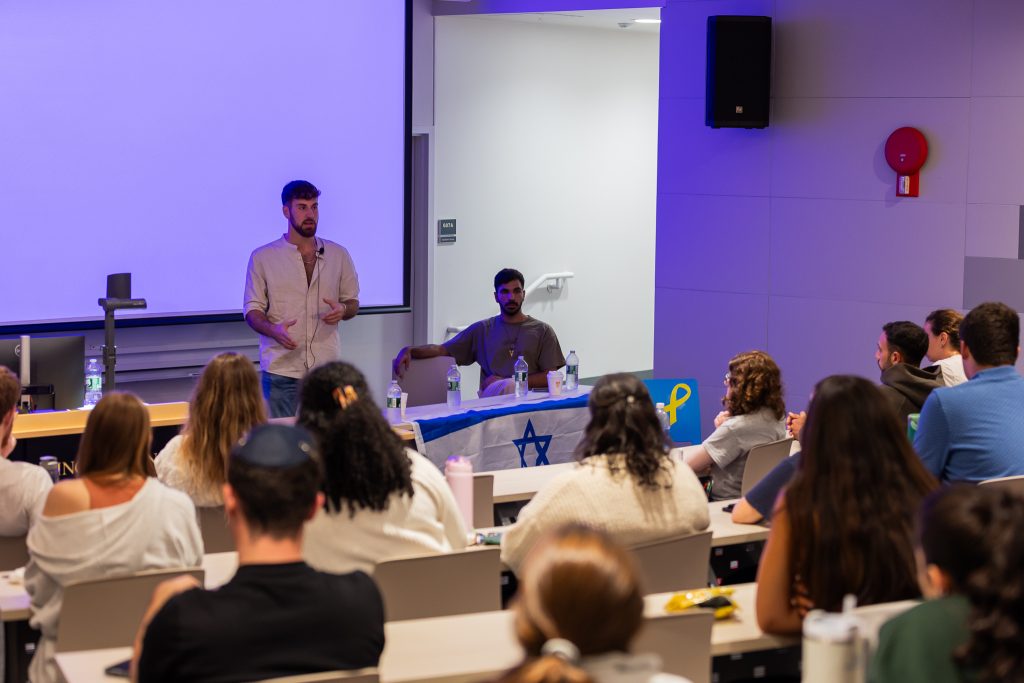Two survivors from the Oct. 7 Nova music festival attack shared their stories with Binghamton University students on Wednesday evening.
The event — hosted by Hillel at Binghamton and the BU Zionist Organization — was run by Israel-Is, an “apolitical organization whose vision is to channel young Israelis and their unique Israeli life story.” The program travels to college campuses across America, sharing testimonies from the Oct. 7 Hamas attack in Southern Israel — where Nova was one of many targeted locations. Others included communities known as kibbutzim and moshavim, two Israeli cities near the Gaza Strip, another music festival and a beach party.
The event was also sponsored by the United Jewish Appeal-Federation of New York and the Building Israel Connections Engagement Project. The Nova survivors, Ohad Seelenfreund, 24, and Roy Yesharim, 24, addressed the group. IDs were scanned at the front, and University police were also present.
“Listening to their stories, as well as those of countless other survivors, is deeply painful and heart-wrenching,” BUZO wrote to Pipe Dream. “It is a reminder that these are not isolated tragedies; every person in Israel, and many in communities worldwide — including our own here at Binghamton University — have personal connections to this violence. Many of us have lost friends and loved ones.”
Following a brief introduction from Israel-Is, Seelenfreund, from Har Adar, a settlement on the border between Israel and the West Bank, who lost seven friends in the attack, spoke. He characterized the Nova festivalgoers as a happy, open and special community that did not expect the attack to happen. According to Seelenfreund, the initial missile strikes, a fairly regular occurrence, did not immediately cause widespread panic.
“As the music stopped we kind of realized ‘OK this is big,’ because the music never stops at these things,” Seelenfreund said. “They’re calling out on the speakers ‘red alert, red alert, the party’s over, everybody go home.’”
While some continued dancing even after the warning, Seelenfreuend drove south with his friends, eventually encountering a police blockade. The mood, which was still calm, shifted quickly when a missile fell near their car.
Describing his experience taking refuge in the kibbutzim, which was home mainly to senior citizens, Seelenfreund said festivalgoers still dressed in party clothes cried and screamed to loved ones on the phone. The attack killed seven of Seelenfreund’s friends, and among them was Johnny, one of his closest friends.
“I’m crying for like five hours straight, just trying to figure out what am I saying at my best friend’s funeral,” Seelenfreund said. “That’s not something a 23-year-old guy should think about and that was one of the hardest parts for me actually.”
Yesharim then described his experience, which began in the early morning. With several others, he traveled to a nearby shelter, at first not fully realizing the scale of the attack before an officer told them to leave. Shooting quickly began from behind the car, and they later fled to a nearby military base.
“When I got back home, I grabbed my phone, and I see a ‘missing’ poster of myself and my friends,” Yesharim said. “Just think how crazy it is to see missing posters that your friends published about yourself. How many people did I make worried? How many people were looking for me?”
A friend encouraged him to attend a recently opened healing center for Nova survivors, which helped him to overcome his difficulty in leaving the house and to “get out and meet new people.” He also met a free-diving instructor living in Eilat — a southern city at the tip of the Red Sea — who told him about the healing power of diving underwater when dealing with post-traumatic stress disorder.
“It was the first time that I gained control over my body,” Yesharim said. “It was the first time that I was able to close my eyes, being with my own thoughts and just be myself. It felt amazing. I’m very happy and proud to tell you that today I am a free-dive instructor. I went through all the courses and decided I’m moving to Eilat.”
A Q&A session was held after Yesharim finished telling his story. He asked if anyone in the audience had visited Israel since Oct. 7 and wanted to share their experience. He said he believed Israeli citizens were now largely united despite political tensions over the past year.
“I think it’s really important to share stories and just to have people hear about what happened on Oct. 7 from people who were there and who experienced it live,” said Arielle Schlissel, the president of Hillel and a senior double-majoring in psychology and anthropology. “I also think that bringing the Jewish community together to hear these kinds of things and having everyone there to support one another is really, really important. It’s something that we have been trying to do at Hillel and with the other Jewish organizations on campus. And I just think spreading information and awareness about what happened a year ago is one of the most important things we can do.”



